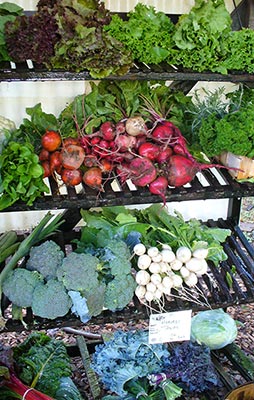 Farmers Markets, CSAs, Organic Markets, Pick Your Own
Farmers Markets, CSAs, Organic Markets, Pick Your Own
From June through October, Farmers Markets and CSAs (Community Supported Agriculture) throughout Massachusetts offer locally grown produce and a way for consumers to meet the growers who produce their food. Here are some websites to explore to find markets and CSAs near you, and other resources for making the most of local produce.
Consumer Supported Agriculture (CSA) NOFA/Massachusetts List
Community Supported Agriculture (CSA) is a way for people living apart from a farm to have an on-farm experience. Members of a CSA buy shares in a farm, and receive a certain amount of fresh, locally grown food every week. At some farms each share member is asked to work on the farm; at others the work requirement is optional or nonexistent. In any case, share members not only get organically grown produce from NOFA farmers, but support local organic farmers by assuring them of a certain level of income for the year.
Farm Fresh Local Food Guide
Farm Fresh helps people and businesses find local food. Type in your city to find the listings closest to you. Serves MA and southern New England. The website has a Harvest Calendar to find the growing season for crops in your locale. They list farmers markets, farm stands, pick-your-owns, and CSAs as well as restaurants, grocers, and food retailers who make an effort to source fresh seasonal ingredients purchased directly from local farms and producers.
Local Harvest
Local Harvest supports small growers and promotes organic agriculture. Type in your zip code and find the Farms, Farmers Markets, or CSAs (Community Supported Agriculture) nearest to you. This website describes what a CSA is and gives the advantages for farmers and consumers. It also gives definitions of such growing status terms as Certified Organic, Naturally Grown, Transitional, Biodynamic, etc.
Mass Farmers Markets
Mass Farmers Markets partners with farmers, consumers, and communities to enhance and sustain farmers markets in MA. Their market listings include information on which vendors and products are at each market. You can sign up to get a weekly reminder about the dates and times of your local farmers market!
Mass Department of Agricultural Resources Farmers Markets
This state ag department website lists all of the farmers markets by county. It has a Crop Availability Guide which lists fruits and veggies that are grown in MA and which months they are available. It also offers selection, storage, and preparation tips for some popular produce items.
Massachusetts Organic Food Guide
This Guide, a project of NOFA/Mass, is a statewide directory of certified organic farms and sustainable farms (farms that practice organic methods but are not formally certified.) You can sort the directory by six regions. There is also a limited listing of businesses that sell organic food, beverages and products ranging from clothing to cleaning supplies. It also describes key reasons to buy and eat organic.
Northeast Organic Farming Association — Mass Chapter (NOFA/Mass)
While many of their offerings are not of interest to vegetarians, they offer workshops at locations throughout the state on organic gardening, food preservation methods (fermentation, pickling, canning, drying, freezing, root cellaring,) and how to grow organic greens and root vegetables in winter. The website describes 10 reasons to buy organic, and NOFA's organic land care program for encouraging organic lawns, gardens, trees, shrubs, parks and athletic fields. Their Local Availability and Food Preservation Guide is here.
Pick-Your-Own / U-Pick Farms
Find out where and when you can pick your own berries, veggies, apples, peaches, and pumpkins.
Mass Association of Roadside Stands and Pick Your Own
Search by product or by region for farms where you can pick your own fruits, veggies, herbs, and maple syrup.
The Food Project
The Food Project has built a national model of engaging young people in personal and social change through sustainable agriculture and producing healthy food. Teens of diverse backgrounds engage in meaningful work and have leadership opportunities. Half of their harvest is donated to local shelters. The remainder of the sustainably grown produce is sold at affordable prices through CSAs and farmers markets that are located in neighborhoods that have limited access to fresh, local, and sustainably grown produce.